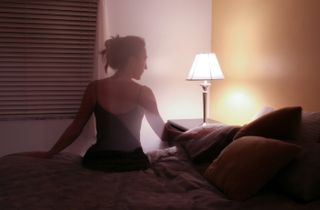Why have I gone off sex? These are the most common issues for couples
Wondering 'why have I gone off sex'? You're not alone. Sex experts say there are plenty of reasons for low libidos


Having a healthy sexual relationship takes work even in the happiest of times, let alone when you’re feeling stressed-out, tired or just plain bored.
If you’re feeling unusually lacklustre in the bedroom and are suddenly wondering, ‘why have I gone off sex?’ then don’t worry - you’re not certainly not the only one.
There will be some couples constantly experimenting with different things, like taking up tantric sex and trying out new sex positions, but that's not the case for most people - sometimes working out how to explain the mental load to free up headspace for sex can help.
And while many people are quick to blame the lasting impact of the pandemic on their waning libidos, the most recent NATSAL survey has revealed that this isn’t necessarily the case. Some people did report having less sexual contact before the lockdown, whether they were living together or not, but half of all those surveyed said that there wasn’t any change in how often they were having sex.
Why have I gone off sex?
There’s no catch-all reason for why people go off sex but “many of us are playing many different roles throughout the day”, explains Emma Davey, relationship counsellor at My Trauma Therapy. “This can be extremely exhausting by the end of the day." This can mean that by the time bedtime comes around, although "this is your time to be the best sexy version of yourself" you just lack the energy, motivation (or both) to be intimate.
This in turn puts added pressure on the situation, which only makes things worse. “Many of us are being pushed to our limits with trying to juggle everything. This means the mind is not having time to relax, causing many of us to lose sense of who we are. This does play a huge part in losing our libido,” she says.
The problem: There's a lack of privacy at home
Whether it’s a bedroom door without a lock on it and a wandering child coming in unannounced, or the constant invasion of group chat messages, most people are finding it harder to get privacy in their own homes.
“Many of us are struggling to get 5 minutes to ourselves at the moment.” Emma says, whether it’s because of family life or jobs crossing over into our personal lives while juggling working from home and kids.
The solution: Space, both mental and physical, is a necessity for healthy sex lives. Emma says that it’s important to create the privacy you need for sex. “You have to think of ways to plan ahead and get the children in bed at a decent time, or end those work calls early so you and your partner can enjoy some alone time."
Emma suggests: “Plan your day and work together to ensure you get a few hours being a couple and to give yourselves time to unwind and enjoy yourselves.”

The problem: Sex has stopped being a priority in your long-term relationship
Whether it’s a 20-year marriage or a one year relationship, it can be difficult to re-ignite the spark once it goes out. But it’s not impossible, says Juliette Karaman, sex and intimacy coach at Feel Fully You.
“Habits which might not be so endearing to the other partner creep in and the “honeymoon period” is over. Having children, running a household and working seems to take over our lives and there is very little time left for anything else. Our bodies have changed, and we may not feel as confident as we did early on in our relationship.”
Solution: “Be curious,” Juliette says, “There are so many factors that can play a huge role, the thing is to be curious instead of blaming!”
Have a date night once a week, she suggests, as a chance to reconnect. Put phones away and make sure you’re undisturbed for at least two hours. Have a shower and get into something comfortable that you also feel attractive in, as “this already signals to your brain that something different is happening, a pattern interrupt”.

“Clear your space, light a candle, put on some music, have it feel good. Tell your partner what you love and appreciate about them.”
Then, switch direction. “Hug your partner for 30 seconds or more. This creates a real connection; it releases endorphins which makes us feel good. We often rush and give a quick hug or peck on the lips. Use a timer (or count). Kiss your partner for 7 seconds or more, again releasing endorphins. ”
The problem: You're suffering with negative body image issues
Body image can affect confidence, says relationship coach John Kenny. “If you are not comfortable with your own body, then it will be hard to accept that anyone else can be.”

“This can lead to you wanting to keep yourself covered, keep the lights off and generally be unable to relax when it comes to sex. If you can't relax during sex, then it is very unlikely to be the pleasurable experience it can be, as your head is just not in the right space,” he says.
And with so many of us experiencing stress and anxiety in other parts of our lives, bringing it into the bedroom as well is not something that anyone wants to do.
“If sex doesn't seem like a pleasurable experience, you will unlikely desire to do it and if the thought of someone seeing you naked upsets you then you will will probably do what you can to avoid it. And your brain will respond to that in kind, lowering your sex drive because of the anxiety it produces.”
Solution: It might sound easier said than done, but working on yourself in this instance is the best idea. “Work on your self-esteem if required, so you feel confident in this area.”
This might be through working with a life coach, who will be able to help you identify the negative beliefs you have about yourself and challenge them with you. Or it could be through your own work, recognising what you’re good at and being more assertive.
Then, John says, “Connect by making time and focusing on your relationship. Make an effort to show you care for each other and create new ways of spicing things up.”

The problem: You think you’re sexual incompatible with your partner
“Having perfectly synchronised sex with your partner is easy in theory but in real life, there are many factors that complicate it. Before you conclude that you’re just sexually incompatible, first consider if it is a sexual problem or there are other issues (personal or relationship wise).” Nadia Deen, sex educator and founder of AM: Appointment, says.
“Then figuring out whether the problem is mismatched sex drives or maybe one of your isn’t getting the type of sex you want is crucial. Trying to fix the frequency of sex won’t solve the problem if one person is not getting the type of sex they want.
Solution: “To figure out your sexual compatibility,” Nadia says, “You really need to understand that it boils down to how well your personal needs, beliefs and desires around sexual activities align with your partner’s.”

To open up the conversation, start by having an open and honest conversation with them. “Acknowledging that there are some issues around the sex you share is so important.” Nadia explains, “Having your sexual advances often rejected or feeling like there is a constant expectation of sex, may lead to resentment or rejection on both sides.”
So while communicating during and after sex is always beneficial, having an initial conversation can make it easier “to guide and suggest during the act itself”.
Nadia says, “When speaking to your partner, try being in a neutral environment if you can. That might mean doing it while you’re going for a walk or even texting.”
The problem: You’re just too tired
Tiredness hasn’t made it onto the list of famous aphrodisiacs for a reason. Feeling tired all the time is one of the most common reasons that people are feeling put off sex, as if you’re exhausted from a long day, any kind of sexual contact is going to be the furthest thing from your mind.
Along with the pressures of work and family life, “time can become a factor, John Kenny explains. You start to experience tiredness and fatigue, so “the focus on your sex life changes.”

Solution: Tackling the tiredness is the natural first step. To get your sex life back on track to what you want it to be like, you can’t be relying on four hours sleep to get you through from morning to night.
It’s also important to address any underlying health conditions that could be making you feel tired, even with enough sleep - such as anaemia or even chronic fatigue.
Then, create a physical space between your day-to-day life and your sex life, especially as we continue to feel the impact of the pandemic.
“In the current circumstances it can be challenging to keep things in the bedroom exciting but it's not impossible, it just means thinking outside of the box.” Emma Davey says, “These are bizarre times for many things, such as socialising and working over the internet. We’re have been living in our PJs or gym wear and can’t remember the last time we got dressed up and felt the sexy version of ourselves.”
To beat the sex slump, “dust off those glamorous outfits and make yourself feel good again. Imagine you’re off to spend a night in a lovely hotel and it’s just you and your partner.
“Mix it up and do something different, try not to fall into the same routine.”

The problem: You have a physical health condition that’s putting you off sex
We chalk a lot of our sex drive up to emotions: how we’re feeling about ourselves, how attracted we are to our partners and our feelings about other things going on around us. But sometimes, there can be something stopping you physically from feeling in the mood.
Dr Deborah Lee, from Dr Fox Online Pharmacy, is a sexual health expert. She explains that among other life-changing conditions, including cancer and diagnoses of a heart condition or diabetes, there are other common problems that women typically face which could make it harder in the bedroom.
Menopause is just one of them, she says. “As women approach menopause and pass through the menopausal transition, there are many changes happening to their bodies, and they have to cope with many unpleasant symptoms. All of this can affect their libido."
Hot flushes and night sweats can make you tired, interfere with sleep, and cause irritability. Other women may be wondering 'Why do I feel sick after sex?', and that can sometimes be solved simply by changing sex position.
“Women also often complain about dryness of hair, skin, and nails.” Dr Lee says, “Vaginal dryness can be an issue. All this together can lead to a loss of interest in having sex and put stress on the relationship.”

Endometriosis, which typically affects around two million women in the UK, has received more awareness in recent years.
“When women have a monthly period, the endometriotic tissue within the pelvis bleeds too. This causes intense pain. It also heals by forming scar tissue, meaning internal organs can get tethered to each other and can't move freely.”
Understandably, Dr Lee says “women experience pelvic pain and painful sex” as a result of this. “This can be so severe the stop wanting to have sex altogether.”
There are also hormone conditions, such as hypothyroidism. This is the result of an under active thyroid, which means that the thyroid gland is producing “too little of the hormone thyroxine” which “leaves you tired, slowed up, and fatigued.
“So much so, you have no interest in sex.”
Hyperprolactinemia is a similar condition where the hormone prolactin is produced, which “disrupts the production of sex horones such as FSH, LH, estrogen and progesterone”, Dr Lee explains.

“As a result, people with hyperprolactinemia fail to ovulate. Because these hormone levels are so low, libido may also be rock bottom.”
The solution: These are just some of the many health conditions that could be putting you off sex - and they can be dangerous to your overall health as well if not properly managed.
“See your GP.” Dr Lee advises, “They will listen to the problem and see what can be done to help. One tool they may use is the ‘Decreased Sexual Desire Screener’ – a questionnaire, which consists of 5 questions and gives a score as to the severity of the problem. You are asked to circle any of the factors you think may be related such as depression, pregnancy, medication, etc.
“Your GP can then help ascertain what is happening, and treat any obvious, underlying conditions.”
They’ll also be able to refer to you to specialists to treat the specific problem.
It's also important to remember that there are other ways to gain intimacy with your partner other than sex.
The problem: You’re on a particular type of medication where the side-effects include a loss of libido
We’re all guilty of skipping through the side-effects section of a medication booklet sometimes, especially if it’s for something we’ve taken time and time again. But regular medications, as well as new ones, could be causing your libido to flatline.
Along with medications to treat physical conditions such as high blood pressure or high testosterone levels, antidepressants and antipsychotics have been known to reduce women’s sex drives in particular.
Many women also report a loss of libido when they change contraception methods, although Dr Lee says the research on this isn’t entirely conclusive. “Some women find their libido improves when they start on certain types of contraception."

Solution: "Each woman is different and if [you are] concerned contraception may be having this effect, it's important not to stop the contraception abruptly, but to go and discuss this with [the] doctor.”
Similarly, if you feel that medication is having an adverse affect on any area of your life, it's important to make a visit to your GP. They will be able to address the issue and suggest an alternative medication.
The problem: You’re suffering with symptoms of physical stress
When you’re under stress, your body switches into “fight, fright and flight” mode. This is to make sure you can run from danger, Dr Deborah Lee explains. “Your heart rate goes up, you start to breathe more rapidly, you start to sweat, and your pupils dilate. This this because you have switched on your sympathetic nervous system (SNS).”

And when you’re feeling constantly stressed or anxious, your SNS is “stuck in over-drive”. As Dr Lee says, “The SNS functions because of an outpouring of chemicals called neurotransmitters – noradrenaline and adrenaline, and due to the effects of the stress hormone cortisol.
“When you are under stress, the levels of all of these remain high. High levels of cortisol are associated with loss of libido. After all, if your body thinks you need to run from danger, it will hardly be preparing for sex.”
Also, depression is linked to stress and anxiety. “When you’re depressed,” Dr Lee says, “You have low levels of the happy hormones, serotonin, and dopamine. You also tend to have low self-esteem and a lack of interest in doing anything pleasurable - including sex.”
The solution: As much as physical health conditions, mental health conditions including anxiety and depression need to be taken seriously.
For chronic stress, simply deciding to take something off your plate might not do the trick. Make an appointment with your GP, who will be able to help you assess your needs.
For specific sexual and relationship problems resulting from stress, Dr Deborah Lee says, you might be referred to a Psychosexual Medicine Specialist or to Relate, who specialise in sex and relationship issues.
“You can refer yourself to these specialists too. Although many people are reluctant to attend, the majority of people find the sessions extremely helpful and wish they had gone earlier.
“Take your partner with you to these appointments if you can, however, you can be seen on your own.”
Goodto Newsletter
Parenting advice, hot topics, best buys and family finance tips delivered straight to your inbox.

Grace Walsh is a Features Writer for Goodto.com, covering breaking news health stories during the Covid-19 pandemic as well as lifestyle and entertainment topics. She has worked in media since graduating from the University of Warwick in 2019 with a degree in Classical Civilisation and a year spent abroad in Italy. It was here that Grace caught the bug for journalism, after becoming involved in the university’s student newspaper and radio station.
-
 The UK's most popular festive baby names are full of Christmas joy
The UK's most popular festive baby names are full of Christmas joyThe most popular festive baby names may be Christmas-themed, but they're still perfect for all year round
By Charlie Elizabeth Culverhouse Published
-
 Kate Middleton reveals relatable parenting rule that Prince George, Charlotte and Louis despise
Kate Middleton reveals relatable parenting rule that Prince George, Charlotte and Louis despiseThe youngsters may be royals, but they still have to follow the same household rules like any other child
By Charlie Elizabeth Culverhouse Published